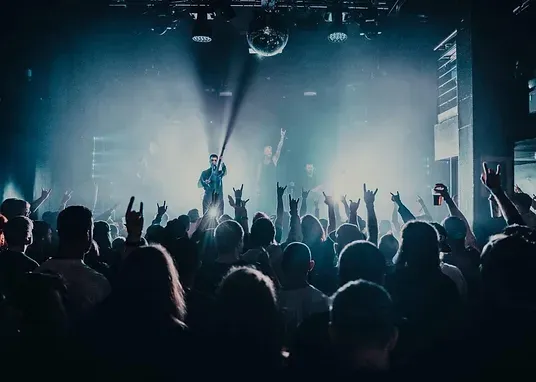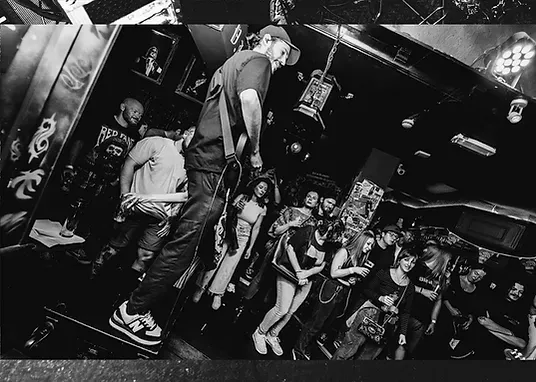Let’s be honest, we’ve all dreamt of putting on our own metal festival at some point. Stages stacked full of our favourite bands, playing non-stop bangers to adoring crowds of like-minded punters. It all sounds amazing, but most of us know that this dream will never happen and therefore leave it up to others to organise our beloved independent metal festivals. But who are these insane people? What drives them to do such a thing? And how many packs of paracetamol and bottles of cider do they require to get through an average week?
Organising and promoting a single night of live music can be challenging enough, but a whole festival with multiple stages across different venues with 30+ acts is beyond complex and fraught with potential jeopardy. Will anyone buy a ticket? Will the right bands be available to book? Will the small stage sound like it’s amplified through someone’s iPhone speaker?
To answer all these questions (and more) we spoke to Joel Wheeler, one of the organisers of UK’s Mangata Festival (FYI, Mangata means a road-like reflection of the moon in water). This year’s impressive line-up features Heavy Blog fayre like Mountain Caller, Burner, Pijn, Boss Keloid and many more. Even though it’s only been around since 2022, Mangata is gaining a glowing reputation as an affordable, well organised and eclectic all-day metal festival.
So, without further ado, let the inquisition begin!

Heavy Blog – For those who have never heard of Mangata Festival, give us your best lift pitch.
Joel – *Rolls up sleeves* Mangata is an independent music festival run by people that eat, drink and bleed music. We want to bring you awesome bands for a reasonable ticket price and create a festival atmosphere that you want to say to your mate who bailed: “Maaan…You missed out!”. We want to create something truly great and with all the feedback we’re getting we feel we’re on-track. We aren’t faceless, you’ll meet us, see us in the crowd and we’ll listen to what you guys want.
HB – What made you (and your colleagues) want to put on an independent metal festival in the first place?
Joel – We’d all worked together on Macmillan Fest (a charity music event) as volunteers, something that Kris (Graham-Martin) headed up very successfully for some years. Both Laura (Pearson) and Kris have a very strong background in events organisation and worked together for years, so I believe it was something they always had in mind, Laura is certainly the main visionary behind Mangata. Both Tom (Else) and I dreamed of such a thing too, so we’ve always wanted to build something like this. We’ve been in bands for years and we just know, from that angle, what would attract bands to want to play.

HB – Nottingham has a great history of metal bands (Iron Monkey, Fudge Tunnel, Pitchshifter, etc) and live music venues. Was Nottingham always going to be the home of Mangata?
Joel – I think so, Nottingham is a unique place, with a number of independent venues and dedicated rock bars in a small central area. People live and breathe music here and they want to support it. This was one of the big reasons why I moved up that way, I was in awe. It felt like the days I used travel into London to places like The Intrepid Fox, Crobar etc. The surrounding areas know Nottingham to be the place to go, Rock City by itself has a long legacy of putting on great bands.
HB – Can you tell us a bit about your process of booking bands, and what attributes you look for?
Joel – There are a lot of factors that can come into play. I don’t think I’m revealing the secret-sauce in saying this, but we often watch the bands live (when we can) to see what kind of show they put on and how engaged they are with the crowd. We’ll also look at their social media activity, upcoming releases, etc. Hell…sometimes we’ll just approach them because we think they’ll be cool to have! Mangata also heads up ‘Metal 2 The Masses’ here in Nottingham, so we see a lot of upcoming bands and that helps decide on what you think would slot into a line-up.
HB – Nearly all the bands you book for Mangata are from the UK, is this on purpose or is it down to logistics and budget?
Joel – The event where this island of ours decided to shoot itself in the foot (as I like to call it jokingly) dramatically changed the landscape and cost of bringing a band in from overseas. Don’t get me wrong, we really want to, but we must be mindful of where that leaves the all-important ticket price. This situation is improving, and I can see it happening soon.
HB – Mangata has a loyal and growing following on social media. Is it important to listen to your community and take peoples requests and suggestions seriously?
Joel – Absolutely! We’ve run lots of polls on various topics, often asking what people would like to see on stage before we build the line-ups. We also put out surveys to get an idea of what’s important to our audience. Feedback is something we thrive off and we’ve made changes on the back of things people suggest. If a band’s name repeatedly pops up, we will check them out. a recent example of this would be fans requesting us to bring back Drip Fed Empire, since they last played in 2022. However, I can understand why some might feel unheard on their ideas or comments, there’s sometimes a lot to take on-board from our side.
HB – Mangata features an eclectic mix of bands from different genres, including djent, metalcore, noise rock, death metal and more. Are you ever tempted to narrow this down and specialise in one area?
Joel – We don’t want to limit ourselves; we all have varied tastes and so do the people that come along to Mangata. We do try to be somewhat intelligent about stage line-ups, but it’s also good to have people move around stages to get the full experience.
HB – Conan, Palm Reader, Heart Of A Coward and now Hacktivist have been your headliners to date. Is there anyone you’d love to get as a future Mangata headliner?
Joel – The midlands area is a hot bed for festivals and day events, so competition is pretty healthy. We’d love to spill some names, but right now I think we’ll have to be kill-joys and keep our cards close to our chest. OK, let’s not kill the question completely…I’d love to get Sylosis!

HB – Organising a festival must be full of complications and stressful situations. Have there been any that have pushed you to the edge?
Joel – Definitely a few! Thankfully we all pull together well when it comes to the crunch. Losing or changing a venue has to be one of the bigger issues we’ve faced. We had to step away from continuing at the first site we had for Mangata 2022. It was a cool outdoor/indoor site with a great brewery…sounds perfect right? The costs were higher than we planned, and we could see it getting even tougher. It’s hard to find the right location, tech spec and capacity for a festival like ours, it can suddenly get very costly and stressful.
HB – I believe you’ve been lucky enough to sell out in 2022 and 2023, but have there been any anxious moments when ticket sales aren’t going to plan?
Joel – I don’t think we’ve spoken to an organiser who doesn’t have sales nerves! We track buying patterns to help us forecast, and post-covid last-minute purchasing is a huge thing, which I’m sure any promoter will tell you. The forecasting helps calm the nerves, but there is always the worry that this will be the one where you don’t get that final push. Whilst we wish we had, unfortunately, we didn’t manage to sell out our first Mangata in 2022 (but we’re glad that we gave that impression after the first event), this was by far one of the biggest learning experiences for us. The ticket sales came in bursts, but more concentrated towards the end, so we were quite nervous checking daily on how it was progressing after social/marketing pushes.
HB – You touched on it before, but can you tell us more about that problematic inaugural year.
Joel – We had a much larger capacity at the Castle Rock brewery site, with very little infrastructure for a festival. That meant no stages, no dedicated security, no crowd barriers, no toilets, etc. So, we needed to hire in a lot of kit. The main stage was a big expense which had delivery/pick-up and pitch-up/take down costs too. We had a real headache with crowd barriers, post covid getting them delivered and picked was hard, especially at an affordable price. We had to call in some big favours on those crowd barriers, otherwise we would have been stuck. You can’t operate a stage with potential for 1K people without security, it could have jeopardised the whole event. We had some struggles getting power around the site too, which we didn’t foresee would be as difficult. You can’t just run a 4-way adapter across the yard, it’s not safe and won’t meet the power demands. We pulled some long shifts to get everything in place before and after the festival.
HB – So, did you manage to break even on that very first Mangata in 2022?
Joel – We came away out of pocket, but we’d factored that in, and you don’t invest in something like this if you’re not prepared for it to go that way and build on a future brand. We could see the potential and the lessons were clear; big ideas, big pockets. Also, on the plus side the brewery sold a crazy amount of beer! We’re in the wrong game, haha!
HB – If someone was thinking of starting their own festival, what three pieces of advice would you give them?
Joel – Here are some points that we feel really matter when you consider putting on an event:
· Start small. We did our first all-dayer event / festival in a 250-capacity pub.
· Create a community, engage with them. We constantly look to the community (e.g. booking of local and national bands) and assess our sales before considering growing our event.
· Make sure you can afford the event you put on. It can take a couple of years to build up consistency and loyalty. If you can’t be consistent, your customers won’t trust you!
I’m in awe of the determination and perseverance required to put on an independent metal festival, or indeed a music event of any kind. Whilst I am quite content with just being a festival punter, I’ll now be more aware of the wrangles and financial burden over things like crowd barriers, security, portable toilets and the venue itself.
Despite all its pitfalls and traumas, putting on a festival still sounds like an incredibly rewarding experience. It must be, right? Or people, like Joel, wouldn’t keep going back year after year and doing it all over again! We NEED these people, because we NEED these festivals in our lives. The world would be a far worse place without them.
If this glimpse into the world of event organising has inspired you to put on your own gig or festival, godspeed to you and your future ventures. Listen to those that have been there, seen it and done it, cut your cloth accordingly and who knows, maybe you’ll be the next metal festival success story in years to come.
Finally, a huge thank you to Joel and the Mangata Festival team for taking the time to answer my questions and give such detailed answers. Here’s hoping 2024 is a sell out!